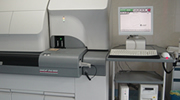Name:Neurointerventional Department
Ward Address :
Outpatient Service Address :
Phone:
Department Info:
The Neurointerventional Department of Zhejiang Hospital’s Brain Center takes the lead in realizing the complete integration and complementary advantages of neurosurgery interventional resources in Zhejiang Province, gives full play to the advantages of nerve intervention, realizes the integration of the diagnosis and treatment process of ischemic and hemorrhagic stroke, and better improves the efficiency of the diagnosis and treatment of stroke. Since its establishment, the Neurointerventional Department has comprehensively carried out the interventional diagnosis and treatment of various cerebrovascular diseases, including the whole brain and spinal cord angiography, subclavian artery stenting, carotid artery stenting, vertebral artery stenting, acute cerebral thrombosis artery thrombectomy, intracranial aneurysm embolization, intracranial vascular stenting, cerebrovascular malformation embolization and other items, and has gradually formed the specialty features with standardized diagnosis and treatment of spontaneous subarachnoid hemorrhage, integrated diagnosis and treatment of acute ischemic stroke, and personalized treatment of complex cerebrovascular diseases.
Subject Features
1. Standardized diagnosis and treatment of spontaneous subarachnoid hemorrhage
Spontaneous subarachnoid hemorrhage is the most common disease with intracranial aneurysm rupture, and most patients have symptoms of headache, or even coma suffered from the disease. Currently, our department has established a standardized diagnosis and treatment plan of spontaneous subarachnoid hemorrhage, including the realization of a smooth and efficient treatment system such as 7 * 24 hours emergency craniocerebral CTA, DSA examination, intracranial aneurysm embolization for intracranial aneurysm rupture and bleeding, and the implementation of individualized treatment plan closely combined with neurosurgery.
2. Integrated and integrated diagnosis and treatment of acute ischemic stroke
The Neurointerventional Department of the Brain Center is closely combining with 120, the Emergency Department, the Clinical Laboratory, the Radiology Department, The Anesthesiology Department and the Catheter Lab, to build an efficient ischemic stroke diagnosis and treatment team. Emergency bridging thrombectomy after rt-PA intravenous thrombolysis within 4.5 hours of onset and emergency thrombectomy within 6 hours of onset has been realized for the patients with acute occlusion of intracranial large vessels, so that a green channel for emergency treatment has been opened for patients with acute ischemic stroke, and mechanical recanalization of emergency intracranial macrovessel acute occlusion was carried out within 7 * 24 hours. Meanwhile, the whole process of management after thrombectomy patients, and offer the patients with individualized treatments according to the various illness conditions from different patients through the multidisciplinary discussions on all ischemic stroke patients, and strengthen the comprehensive diagnosis and treatment management of patients after surgery, so as to promote the smooth rehabilitation of patients, and give patients the safest guarantee. In view of the combination of cerebral infarction and sequelae of cerebral infarction, combine with neurological rehabilitation, neurobioelectrical stimulation, CPM functional exercise, acupuncture and other means to promote the patient's recovery and assist in the recovery of neurological function and treatment.
3. Individualized treatment of complex cerebrovascular diseases
Complex cerebrovascular diseases, including cerebral arteriovenous malformation, traumatic internal carotid artery cavernous sinus fistula, dural arteriovenous fistula, etc., have MDT discussion in the brain center according to the disease form, symptoms and radioimaging results, so as to provide optimal individualized comprehensive treatment for patients.
Outpatient Information:
Chief physician Wan Shu: Monday morning for expert outpatient, Thursday morning for famous doctor outpatient
Associate chief physician Wu Jiong: Tuesday morning for expert outpatient
Associate chief physician Gong Jie: Friday morning for expert outpatient
Associate chief physician Zhou Yumiao: Thursday afternoon
Cerebrovascular Disease Special Outpatient: The whole day of Friday
Subject Experts:
Gong Jie
Associate chief physician
Wan Shu
Chief physician, professor, postgraduate tutor
Wu Jiong
Chief physician
Zhou Yumiao
Associate chief physician
Expert:





